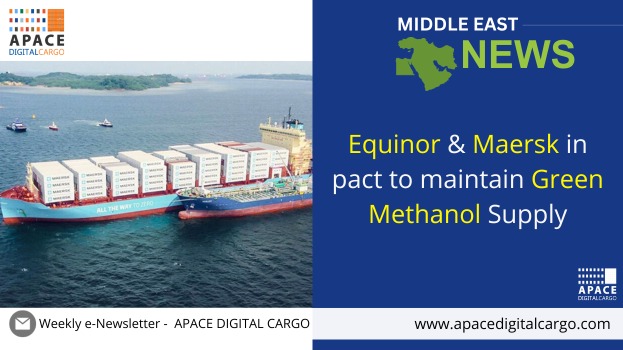
A.P. Moller – Maersk (Maersk) and Equinor have inked an agreement to provide green methanol supply for Maersk’s historic, new methanol-enabled feeder vessel during its initial months of operation beginning in September 2023 and continuing into the first half of 2024.
The arrangement assures that the ship will be able to operate in a loop from Northern Europe into the Baltic Sea following the name-giving ceremony later this month in Copenhagen. In Rotterdam, the green methanol will be stored.
Alex Grant, Senior Vice President for the liquid commodity segment at Equinor said, “Equinor is pleased to be partnering up with Maersk in delivering greener fuels to the marine industry.”
Equinor is an established player in the European methanol market through its production plant at Tjeldbergodden and we have ambitions to be a key provider of green methanol in the marine fuel segment, the bio methanol is produced from biogas from manure. The biogas is upgraded to bio methane and injected into the existing gas grid and the methanol is produced from the bio methanol in the grid on a mass-balance basis.
The present European biogas certificate system is used to trace the properties of bio methane to bio methanol and avoid double-claims. Green methanol may thus be manufactured in current facilities utilising existing infrastructure and equipment, allowing for a rapid route to market.
The technology can help to create a greener gas grid by collecting harmful methane emissions that would otherwise be produced by the manure feedstock. In compliance with the EU Renewable Energy Directive, the bio methanol is ISCC EU certified.
Rabab Boulos, Chief Infrastructure Officer at A.P. Moller – Maersk said, “We are very pleased to partner with Equinor, as it’s entering this business area. It is critical to get energy majors to the table and start supplying future fuels at scale.”
“This is the form of engagement we need to continue accelerating the pioneering journey towards a green fuel economy for global shipping. With more than 100 methanol enabled vessels on order across the industry, the demand for green fuel production is rising and will continue to do so in the years to come.”
Long-term, the feeder vessel will be powered by e-methanol produced at a European Energy facility in Southern Denmark, which is set to open in the first half of 2024.
Maersk has set an ambitious goal of achieving net zero greenhouse gas emissions by 2040, with the goal of transporting at least 25 percent of ocean cargo using green fuels by 2030.
The 2,100 TEU (twenty-foot-equivalent) feeder vessel is a crucial step towards Maersk’s long-term goal of progressively updating the whole fleet to run entirely on green fuels.
Maersk has ordered 24 more methanol boats for delivery between 2024 and 2027, and the company has a policy of only ordering new, owned vessels with a green fuel alternative.




